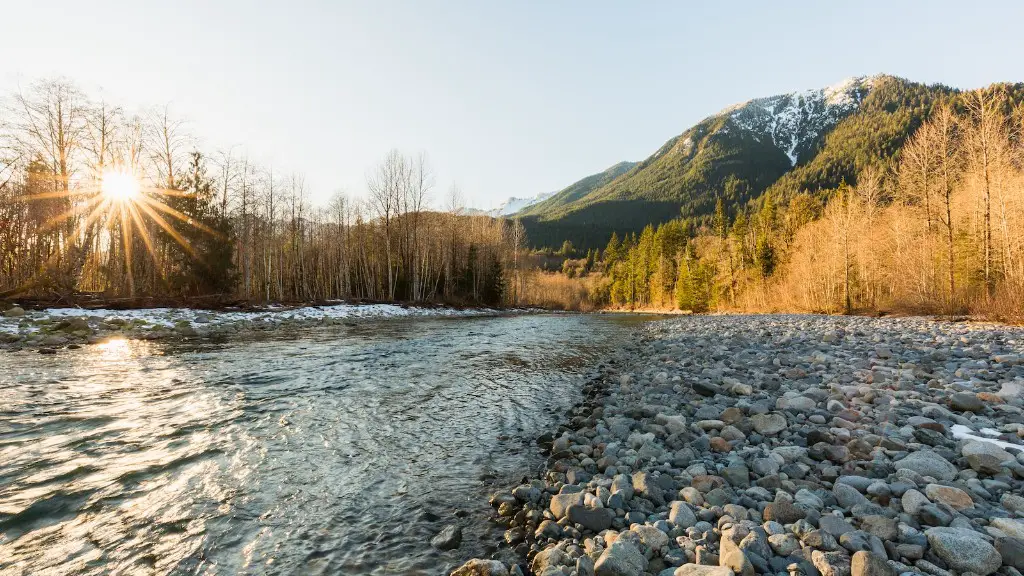Chances are, the water in the Mississippi River isn’t your first choice when it comes to drinking water. It’s a huge, powerful river that stretches from Minnesota in the North to Louisiana in the South. While it is used for shipping and recreation, the question of whether or not is safe to drink the water in this river is a valid one. The answer, unfortunately, varies depending on where you’re getting it from.
The quality of Mississippi River water varies from place to place. Oftentimes, the water near the source or headwaters of the river is much cleaner than the water further downstream. That is because, as it flows downriver, the water picks up pollutants, chemicals, and other contaminants from things such as farm runoff and industrial waste. Since the water has traveled such a great distance, it doesn’t have the same quality when it reaches its end.
Yet, there are some areas where Mississippi River water is safe to drink. The Minnesota Pollution Control Agency has tested the water in several locations throughout the state and found that, near the headwaters, the water is of good quality and safe to drink. Similarly, the Wisconsin Department of Natural Resources has determined that water near the headwaters in that state is suitable for drinking, cooking, and other domestic uses.
But even if the water is considered safe for consumption, there are still potential risks. Many potential contaminants are not visible to the naked eye, so it is important to be aware of the potential risks before drinking from the Mississippi River. Additionally, it is important to note that drinking river water may pose a risk of infection from bacteria, viruses, and other pathogens. As a result, it is not recommended to drink the water from the Mississippi River unless you are certain that it is safe.
Overall, it is important to remember that the Mississippi River is a vast, powerful body of water and that the quality of the water can vary from place to place. It is best to err on the side of caution and avoid drinking the water unless it has been tested and deemed safe by local authorities. It may also be worth considering an alternate source of drinking water.
Effects of Pollutants on Mississippi River
The Mississippi River is a major source of fresh water for many major cities including New Orleans, Memphis, and St. Louis. Unfortunately, it is also the recipient of a large amount of pollutants mainly from the agricultural runoff, industrial waste, and untreated municipal wastewater. These pollutants are very dangerous to the river’s ecosystem and can have far-reaching consequences.
One of the major problems caused by the pollutants entering the Mississippi is decreased water quality. Nutrients such as nitrogen and phosphorus can lead to algal blooms and other forms of aquatic plant growth, which can decrease oxygen levels in the water and make the water less suitable for drinking. There is also a risk of contamination from many of the pollutants, including metals, pesticides, and other toxic compounds.
The pollutants that enter the Mississippi contribute to other major issues as well. Some of these include sedimentation, which can lead to the destruction of aquatic habitats and wetlands and reduce the river’s ability to support aquatic life. The runoff from agricultural and industrial activities can also bring excess nutrients that can lead to the overgrowth of harmful species such as invasive species, which can cause major disruptions to the river’s ecology.
The bottom line is that the pollution entering the Mississippi River has a wide range of implications both to the environment and to those who rely on the river for their drinking water. While stringent measures are in place to try to control and reduce the amount of pollutants entering the river, it is important to remember that the long-term effects of these pollutants can be just as damaging.
Impact of Climate Change
The effects of climate change are being felt across the world, and the Mississippi River is no exception. With rising air and water temperatures, the river is facing a variety of changes that could severely affect its water quality and the surrounding ecosystems.
One of the major impacts of climate change is the altered hydrology of the Mississippi. Warmer temperatures mean more water evaporation, which can lead to lower water levels in the river. This will have a negative effect on the water quality, leading to increased pollutants and reduced aquatic habitats and species. Warmer temperatures can also lead to higher summer flows, which can lead to an increased risk of flooding.
Climate change can also have an effect on the availability of water. Warmer temperatures lead to more frequent periods of drought, which can reduce the amount of water available for agricultural and other uses. This could lead to an increased risk of water shortages and decreased access to drinking water.
The bottom line is that climate change is having an immense impact on the Mississippi River, and it is likely to become more pronounced in the years to come. It is important to be aware of the ways in which the changing climate is affecting the river, both in terms of quality and availability, in order to take appropriate steps to protect both the river and those who rely on its resources.
The Recreation and Fishing Industry
The Mississippi River is a major source of recreation and tourism. For many individuals and communities, recreational activities such as fishing and boating on the river are a major source of income and enjoyment. Unfortunately, these activities can be put at risk by pollutants in the river.
High levels of pollutants can affect the health of fish and other aquatic species, making them less desirable for recreational fishing. Contamination of the river can also make the water unsafe for recreational activities such as swimming and boating. The presence of pollutants can also lead to the closure of certain areas of the river, making it difficult for tourists and recreational fishers to access.
The health of the Mississippi River is important in order to protect the recreational activities that are supported by it. Without a healthy river, many of the enjoyment and livelihoods that rely on it could be put at risk. It is important to take steps to protect the river and its resources in order to ensure that these activities are able to continue in the future.
Community Education Programs
A key part of ensuring that the Mississippi River remains healthy is educating the people who live along it about the effects of contaminants on the water and environment. By educating individuals on the dangers of pollution, they can take steps to reduce their impact and help ensure that the river stays healthy.
Education programs can both inform people of the dangers of pollution and teach them about ways to reduce their own impact. Residents can be given information on proper disposal of pollutants and provided with community resources on best practices for managing runoff and wastewater. Additionally, education programs can promote the importance of conservation and encourage individuals to work together to protect the river.
Taking the time to educate community members about the importance of the Mississippi River is an important step in ensuring its health. Education programs are an effective way to teach people about the risks of pollution and how to protect the river and its resources.
Environmental Regulations
In order to ensure that the Mississippi River remains healthy and suitable for drinking, swimming, and other activities, there must be rigorous environmental regulations in place. These regulations must work to protect the river from pollutants and ensure that the water is of the highest quality.
Environmental regulations can take many forms, such as limits on the amount and type of pollutants allowed in water, requirements for wastewater and runoff management, and fines for those who violate the regulations. Additionally, these regulations must be regularly enforced in order to ensure that they are being followed.
Creating and enforcing environmental regulations is an important step in taking care of the Mississippi River. Without regulations in place, the water quality could quickly deteriorate, leading to potential water shortages, unsafe drinking water, and disruption of aquatic habitats.
Management Strategies
In addition to environmental regulations, there are also management strategies that can be used to protect and preserve the Mississippi River. One such strategy is ecosystem-based management, which focuses on conservation and protection of the river and its resources rather than just stopping or mitigating pollution.
Ecosystem-based management involves a variety of initiatives such as increasing water storage capacity, restoring wetlands and riparian habitats, and improving water quality through various projects. This type of management focuses not only on stopping pollution, but also on actively taking steps to ensure that the river and its resources are protected and preserved.
Managing the Mississippi River requires a multi-pronged approach. Implementing both environmental regulations and management strategies is the best way to ensure that the river is healthy and that its resources are protected for future generations.





